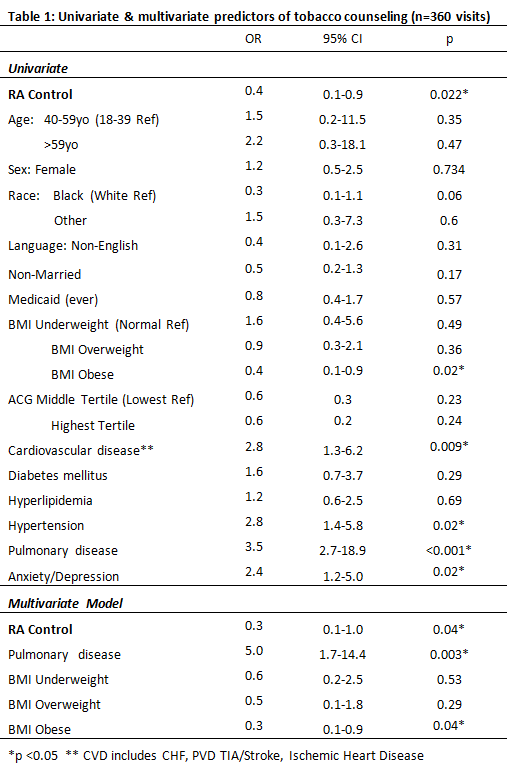Session Information
Session Type: ACR Poster Session C
Session Time: 9:00AM-11:00AM
Background/Purpose: Tobacco use is a risk factor for
developing rheumatoid arthritis (RA) and a predictor of more severe disease and
heightened cardiovascular disease (CVD) risk. Despite these known health
effects, there is significant variation in rheumatologists performing tobacco
cessation counseling. Herein we examine the frequency and predictors of tobacco
discussions in RA visits among a cohort of RA patients with at least one
additional CVD risk factor. We hypothesized that tobacco cessation counseling
would occur more frequently in patients with well-controlled RA due to fewer
competing demands for clinical time.
Methods: Electronic health records were used to
identify RA patients with either high cholesterol or uncontrolled blood
pressure in 3 rheumatology clinics (2004-2011) within an academic center for a
prior study. Uncontrolled cholesterol was defined as LDL >100 in individuals
with diabetes, CVD or chronic kidney disease or LDL>130 without one of these
conditions. Uncontrolled blood pressure was defined according to JNC-7. Trained
abstractors reviewed clinic notes using a standardized tool to identify CVD
risk discussions including tobacco counselling, and to assess perceived RA
control. Perceived RA control was defined as subjectively stated by a rheumatologist
in the visit note. We used logistic regression to calculate the odds ratios
(OR) and 95% confidence intervals reflecting RA control as a predictor of
tobacco cessation counseling after controlling for sociodemographics,
comorbidity (ACG score) and clinic.
Results: 3707 RA visits were abstracted, of which 360
visits involved active tobacco users. RA tobacco users had a mean age of 53
years, 73% were female, 79% white and BMI of 29 ± 7 (mean ± SD). Physician-perceived
well-controlled RA was present in 31% of tobacco user visits (42% of non-user).
Of the 360 visits, documentation of smoking status occurred in 43% of visit
notes. Counseling was only documented in 10% of total visits (n=37). In
contrast to our hypothesis, patients with well-controlled RA were less likely
to receive tobacco cessation counseling (OR 0.25, 0.09-0.68; Table 1). Obese
BMI was an additional negative univariate predictor. Positive univariate predictors
of tobacco cessation counseling included CVD, pulmonary disease, hypertension,
or anxiety-depression at baseline. In a multivariate model RA control remained
significant, as did pulmonary disease, and obesity. Limitations of our study
include small size and reliance upon physician documentation for occurrence of
counseling events.
Conclusion: Perceived uncontrolled RA predicted more
likely tobacco cessation counseling by rheumatologists, but overall rates were
low. Given the clear negative health effects of smoking on patient’s RA disease
severity and CVD risk, systematic efforts are needed to employ evidence based
practices for promoting tobacco in rheumatology clinics.
To cite this abstract in AMA style:
Vreede A, Voelker K, Wong J, Bartels CM. Rheumatologists More Likely to Perform Tobacco Cessation Counselling in Uncontrolled Rheumatoid Arthritis Visits [abstract]. Arthritis Rheumatol. 2015; 67 (suppl 10). https://acrabstracts.org/abstract/rheumatologists-more-likely-to-perform-tobacco-cessation-counselling-in-uncontrolled-rheumatoid-arthritis-visits/. Accessed .« Back to 2015 ACR/ARHP Annual Meeting
ACR Meeting Abstracts - https://acrabstracts.org/abstract/rheumatologists-more-likely-to-perform-tobacco-cessation-counselling-in-uncontrolled-rheumatoid-arthritis-visits/

